

Pinterest. Pinterest. Pinterest. Pinterest. Pinterest. Pinterest. Pinterest. Pinterest. Pinterest. Themes & Things To Keep In Mind When Writing Fantasy Stories and Adventures » Daily Encounter. This list is far from complete.

It’s not even trying to be complete. It knows better than that. It just wants to be helpful and provide some inspiration here and there; you know, offer little suggestions that might lead to bigger ideas. (Especially by using the words offered as Wikipedia searches!) Feel free to make suggestions in the comments! Weather. Write A Kissing Scene.
The Kiss...the moment when lips meet, when senses are heightened, when hearts meld.
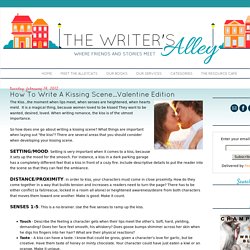
It is a magical thing, because women loved to be kissed They want to be wanted, desired, loved. When writing romance, the kiss is of the utmost importance. So how does one go about writing a kissing scene? What things are important when laying out "the kiss"? There are several areas that you should consider when developing your kissing scene. SETTING/MOOD: Setting is very important when it comes to a kiss, because it sets up the mood for the smooch. Online Etymology Dictionary - Comodo IceDragon. Apocalypse Now. Descriptive Writing Techniques. Things Writers Forget When Writing Fight Scenes. Recently, I attended VCON, a science fiction and fantasy conference in Surrey (part of Metro Vancouver) and attended a session called “Writing About Fighting.”
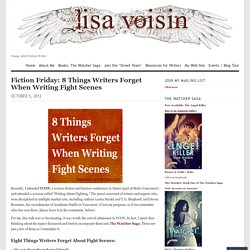
The panel consisted of writers and experts who were disciplined in multiple martial arts, including authors Lorna Suzuki and T.G. Shepherd, and Devon Boorman, the swordmaster of Academie Duello in Vancouver. (I lost my program, so if you remember who else was there, please leave it in the comments, below) For me, this talk was so fascinating, it was worth the cost of admission to VCON. In fact, I spent days thinking about the topics discussed and tried to incorporate them into The Watcher Saga. 1. Fictional Culture. The way I build worlds is by collecting cool stuff from the history, myth and people around me.

I blend these details with my own imagination, and create my own cultures. Culture is a vital part to realistic worldbuilding. Normally there are a few particular cultures that interest me at a given time. I read whatever I can find about them, their environment, their traditions and their myths. The interesting details filter into the new world I’m creating (example: at one time, Venetian widows could only remarry on the stroke of midnight). Creativity. Naming Your Novel. Note: How careful you have to be naming your novel depends heavily on if you are planning to sell it, and how you are planning to sell it.
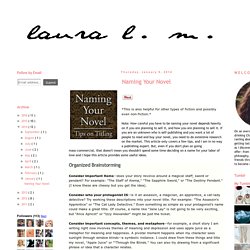
If you are an unknown who is self-publishing and you want a lot of people to read and buy your novel, you need to do extensive research on the market. This article only covers a few tips, and I am in no way a publishing expert. But, even if you don't plan on going mass-commercial, that doesn't mean you shouldn't spend some time deciding on a name for your labor of love and I hope this article provides some useful ideas. Organized Brainstorming Consider important items--does your story revolve around a magical staff, sword or pendant? Writing Killer Fight Scenes. Fight scenes are dangerous territory for writers.

On the surface, they seem as if they’re guaranteed to keep the reader glued to the action in the same way as they often do at the movies. In reality, though, readers tend to skip over fight scenes – skimming the long, tedious, blow-by-blow descriptions in favour of getting back to the dialogue and character-driven drama that truly engages them in the story. My novel, Traitor’s Blade, is a swashbuckling fantasy in which fight scenes are a crucial part of the storytelling. Publish Your Novel. Truths About Fiction. The following essay was previewed in the class that Stephen Graham Jones taught for LitReactor, Your Life Story Is Five Pages Long. 1.
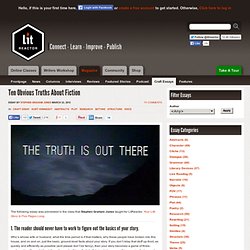
The reader should never have to work to figure out the basics of your story. Tips And Tricks For Writing. So what do you do when you’re pressed for time, swamped under works and you still need to get some stuff written, and written well?

Your nerves are tightened up so well that you can’t sleep, but you can’t squeeze even a sentence out of your mind. I know the feeling so well, but what I did then was, just start writing fast without even thinking, then a professional article was born with the time shorter than usual. Heck, it might be even more professional than my previous articles! (Image Source: Fotolia) The phenomena has nothing to do with the God I worship, or any supernatural phenomenon, it’s just how brain works: we write fast and professionally if we can just limit something, abandon certain habits, and put up some beneficial habits. Articles you might be interested as well: 1. Writing - Author Central. Dystopian Writing Prompts. Writing Tips. Dystopia. Dystopian fiction is really hot right now.
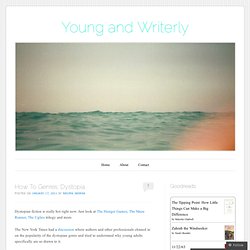
Just look at The Hunger Games, The Maze Runner, The Uglies trilogy and more. The New York Times had a discussion where authors and other professionals chimed in on the popularity of the dystopian genre and tried to understand why young adults specifically are so drawn to it. What exactly is dystopian? Dystopia, according to Merriam Webster, means an imaginary place where people lead dehumanized and often fearful lives. It’s the anti-utopia, the anti amazing heavenly paradise. Stories in the dystopia genre are dark, conflict-driven and usually take place sometime in the future after something horrible has happened to the Earth whether through an apocalypse, government takeover, war, drought etc. Coming up with the back story in a dystopian novel is where a writer can be truly inventive in social commentary and criticism.
My favorite contemporary dystopian novel is The Hunger Games series by Suzanne Collins, which I’m on book 2 of.